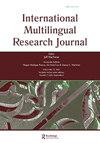Dialect competence, dialect attitude and social inclusion: A case study of migrants in Chongqing, China
IF 2.1
1区 文学
Q2 EDUCATION & EDUCATIONAL RESEARCH
引用次数: 0
Abstract
ABSTRACT Adopting methods of the questionnaire, matched-guise test and semi-structured interview among different occupational groups of migrants in Chongqing, China, the present study investigates the correlation between dialect competence, dialect attitude and social inclusion. The results show that entrepreneur migrants have the highest dialect competence, followed by labor migrants and intellectual migrants. All the migrants’ attitude toward Mandarin Chinese, mainly reflected in the “emotional cognitive” and “social evaluation” dimensions, is significantly more positive than that toward Chongqing dialect. In terms of social inclusion, the entrepreneur migrants rank highest, followed by intellectual migrants and labor migrants. Statistics indicate that there is a significant correlation between migrants’ social inclusion and their dialect competence and attitude (in particular, the “emotional cognitive” dimension of their dialect attitude plays an important role in affecting their social inclusion). In addition, the semi-structured interview reveals that the migrants’ language environment of working and living is a crucial factor affecting their dialect competence, dialect attitude, and hence their social inclusion. Based on the results, this paper provides suggestions on how to improve migrants’ social inclusion from a language planning perspective.方言能力、方言态度与社会包容:以重庆外来人口为例
摘要本研究采用问卷调查、配对伪装测试和半结构化访谈等方法,对重庆市不同职业群体的外来人口进行了方言能力、方言态度和社会包容的相关性研究。结果表明,企业家移民的方言能力最高,其次是劳动力移民和知识移民。所有外来人员对普通话的态度,主要体现在“情感认知”和“社会评价”两个维度,均显著高于对重庆话的态度。在社会包容性方面,企业家移民排名最高,其次是知识移民和劳动力移民。统计数据表明,移民的社会包容与他们的方言能力和态度之间存在显著相关性(尤其是他们方言态度的“情感-认知”维度在影响他们的社会包容方面发挥着重要作用)。此外,半结构化访谈显示,移民的工作和生活语言环境是影响他们的方言能力、方言态度以及社会包容性的关键因素。基于研究结果,本文从语言规划的角度对如何提高移民的社会包容性提出了建议。
本文章由计算机程序翻译,如有差异,请以英文原文为准。
求助全文
约1分钟内获得全文
求助全文
来源期刊
CiteScore
4.10
自引率
4.80%
发文量
19
期刊介绍:
The International Multilingual Research Journal (IMRJ) invites scholarly contributions with strong interdisciplinary perspectives to understand and promote bi/multilingualism, bi/multi-literacy, and linguistic democracy. The journal’s focus is on these topics as related to languages other than English as well as dialectal variations of English. It has three thematic emphases: the intersection of language and culture, the dialectics of the local and global, and comparative models within and across contexts. IMRJ is committed to promoting equity, access, and social justice in education, and to offering accessible research and policy analyses to better inform scholars, educators, students, and policy makers. IMRJ is particularly interested in scholarship grounded in interdisciplinary frameworks that offer insights from linguistics, applied linguistics, education, globalization and immigration studies, cultural psychology, linguistic and psychological anthropology, sociolinguistics, literacy studies, post-colonial studies, critical race theory, and critical theory and pedagogy. It seeks theoretical and empirical scholarship with implications for research, policy, and practice. Submissions of research articles based on quantitative, qualitative, and mixed methods are encouraged. The journal includes book reviews and two occasional sections: Perspectives and Research Notes. Perspectives allows for informed debate and exchanges on current issues and hot topics related to bi/multilingualism, bi/multi-literacy, and linguistic democracy from research, practice, and policy perspectives. Research Notes are shorter submissions that provide updates on major research projects and trends in the field.

 求助内容:
求助内容: 应助结果提醒方式:
应助结果提醒方式:


